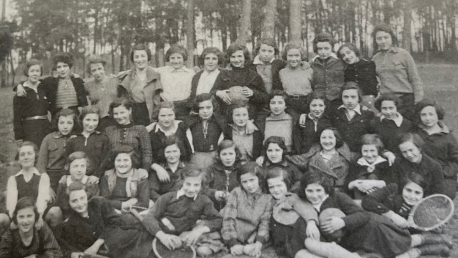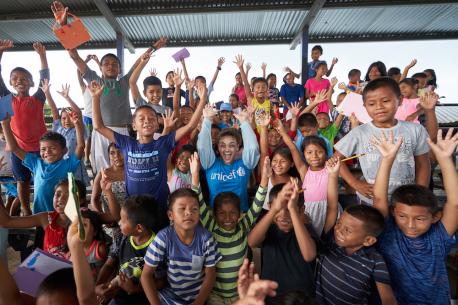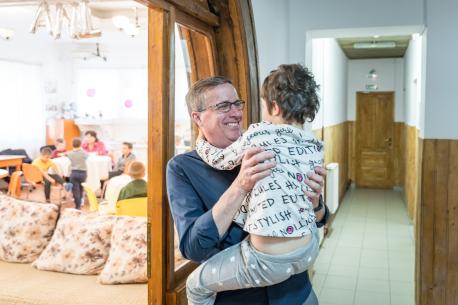
UNICEF USA's Michael J. Nyenhuis on Mental Health & the War in Ukraine
Following a recent visit to Romania, where he spent time with refugee children and mothers who had fled the war in Ukraine, UNICEF USA's President and CEO discusses the importance of supporting children's mental health as part of the emergency response — and what Americans can do to help.
UNICEF USA President and CEO Michael J. Nyenhuis recently spoke with Steven Scully, a guest host on SiriusXM's POTUS Politics channel, about UNICEF's response to the war in Ukraine and Nyenhuis's April visit to a Blue Dot refugee support center in Romania. These hubs have been set up along key transit routes by UNICEF and UNHCR, in coordination with local authorities and partners, to provide protection and mental health support and other services to children and families fleeing the war. The following is a recap of that conversation.
We've seen the pictures. We're reading the stories. It is heartbreaking. Millions have left Ukraine. And you have to wonder what the long-term impact is going to be on women and children. So tell us what you've been seeing and tell us your biggest concerns.
MICHAEL NYENHUIS: Thanks for the focus on this particular aspect of this tragedy in Ukraine. We strongly believe that mental health is one of the often overlooked parts of conflict. Not enough attention is generally given to it.
UNICEF has put a high priority on providing mental health support. Put yourself in the mind of a child, who, a couple of months ago, was at home, in school, in their neighborhood with their friends and all their activities, and suddenly all of that is pulled away, while you’re also hearing air raid sirens and bombings and maybe you’re spending many days or nights in a basement or subway or in another type of shelter. It is incredibly traumatic for kids to be uprooted from all of the things that give them stability in life. There are millions of children suffering mental health issues because of this war, and we want to be really active in supporting that.
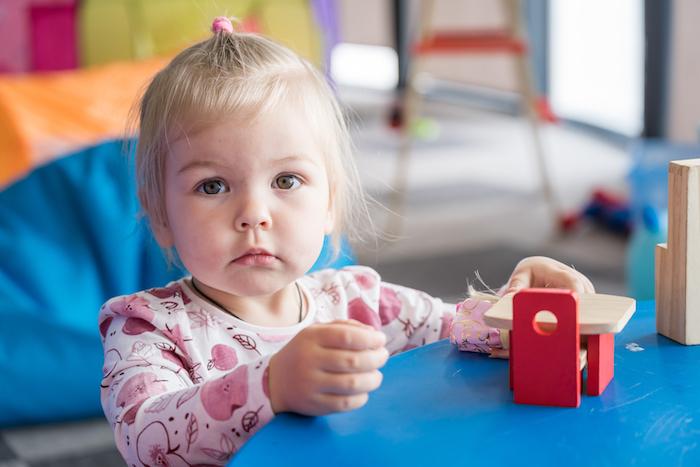
UNICEF's response to the war in Ukraine includes providing mental health and psychosocial support for traumatized children. Play spaces at the Blue Dot refugee support centers are an important component of those efforts. Above, a child makes a home for a doll at the Blue Dot in Brasov, Romania, on April 19, 2022.
Are there lessons that we can learn, going back to World War II, or more recently, Syria?
MICHAEL NYENHUIS: I think the first one is that we need to make mental health services available. UNICEF is doing this in a significant way within Ukraine itself, with mobile mental health and psychosocial support teams reaching out to kids who are displaced from their homes. We often talk about the refugees, the 2.5 million kids who have left the country. But there are at least an equal number inside the country who have been displaced from their homes and are elsewhere inside Ukraine. That population is a concern for us, too; we have mobile mental health psychosocial teams working with them too.
The first thing we do is make sure those services are available to children still in Ukraine and to refugees who are across the border. Remember that kids need a safe space. They need to be protected. They need to have an opportunity for play. They need to get back to education. And so building some of that stability around them is something we need to do.
The refugees from Ukraine are 90 percent women and children, is that right?
MICHAEL NYENHUIS: Absolutely. This is a different kind of refugee crisis than what we've seen before.
I was in Romania just a couple of weeks ago working with our teams that are supporting those who have crossed the border. I had a chance to talk to a number of moms and their kids and hear about their experiences, leaving their husbands and fathers behind to stay to fight and crossing the border themselves. All of those points are real risks for children, which is why we put a high priority on child protection, child registration, making sure we keep track of everybody, that they're connected to their families. We have helped establish what we call these Blue Dot centers, which are full-service refugee centers at transit points to make sure that they're cared for. It was heartbreaking to hear the stories of what they went through — and to think about a child going through this incredible experience, which will have long-lasting effects if we don't address it right away.
It's been reported that Ukrainian women and children trying to come to the U.S. are facing a lot of bureaucracy, a lot of paperwork, with many being essentially turned away. From your standpoint, why is it so hard? We've heard President [Biden] saying, "Please come, we'll welcome 100,000 Ukrainians to the U.S.," but it's easier said than done.
MICHAEL NYENHUIS: Yes, this is an area of division and debate in our country. UNICEF believes that every child that comes to our country seeking asylum should get the chance to be heard and given that opportunity. And in this case, I think we need to open those doors and let them come as the President has agreed. And we need to play our part.
One thing I was so impressed with in Romania is the way that Romanian people have embraced the Ukrainian refugees who crossed over. It's amazing to see people come out to volunteer, to help out. They're donating goods and food and clothing, and helping to run some of these refugee centers. Those open arms and that welcome is what we need to see here, too.
You've seen the pictures out of Mariupol, in that steel plant where so many were in the basement for three, four or five weeks — no light, a shortage of food. These children have seen things that most people should never see. What is the psychological impact of this on these children?
MICHAEL NYENHUIS: It is long-term. It is scarring. This is just the truth. Again, this is why the increase of mental health services is so important.
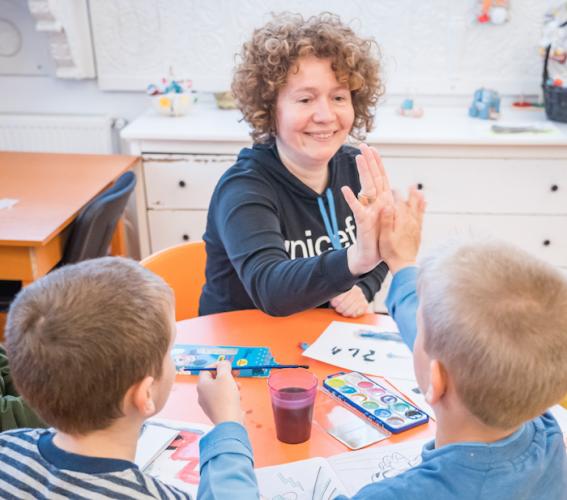
Despina Andrei, Communication and Fundraising Manager for UNICEF Romania, chats with refugee children from Ukraine who are receiving support at a residential care center in Baicoi.
One of the things that we have been advocating for in Washington is a bill that is moving its way through Congress called the MINDS Act, which prioritizes mental health and psychosocial support funding in U.S. foreign assistance. It would increase the amount of attention and focus on mental health and psychosocial support as a real need, just like clean water, just like basic nutrition.
We'd love for people who are passionate about that to go to our website and look for a way that they can advocate with their congressional representatives to move that along.
How do we prevent the trafficking and the exploitation of these children?
MICHAEL NYENHUIS: It's one of our major concerns when children are on the move. And it's why we put a high priority on child protection services and registration of children and reunification with families. So if you were an unaccompanied child who came across the border and came through one of our Blue Dot refugee centers, we have immediate registration, reconnection with family and child protection — linking with the child protection services that are in the host countries like Poland and Romania as well — to make sure that the kids are protected. It is a huge concern.
So you mentioned traveling to Eastern Europe and looking into the faces of those children and their moms. What did you see?
MICHAEL NYENHUIS: A combination of heartbreak and resilience. I met a mother with a 4-year-old daughter who is diabetic. They were in southern Ukraine. For the daughter to be healthy, she needs access to insulin. She needs access to good nutrition, and she needs a safe and secure environment. And all three of those were dwindling. So they got up in the night and got in the car and did the long drive to the Romanian border, and spent six hours crossing that border. They found their way into Romania, into the welcoming arms of Romanian citizens and to support from UNICEF teams in Romania. Just to hear their story was heartbreaking. But there is also some relief and the sense that maybe there is a future, as they were in a safe place finally. But the father is back in Ukraine and they just they don't know what's going to happen.
Another story that really stuck with me came from the caregivers of 30 young people who had been living in a home in Ukraine for intellectually disabled kids. The caregivers described their own experiences having to care for these 30 kids, to find transportation for them, get them across the border and find a place in Romania for them as well. The resilient spirit of these caregivers — they would do whatever it took to make sure those 30 kids were safe.
You wonder what Ukraine will look like for refugees returning home, hopefully someday soon.
MICHAEL NYENHUIS: An important part of kids’ mental health is their ability ot have a stable environment and that includes their schools. And a countless number of schools have been attacked. These should be safe places for kids. As part of the rebuilding in Ukraine, of these places that have been hit, we need to remember that schools are such an important part of kids getting back to some sense of normalcy.
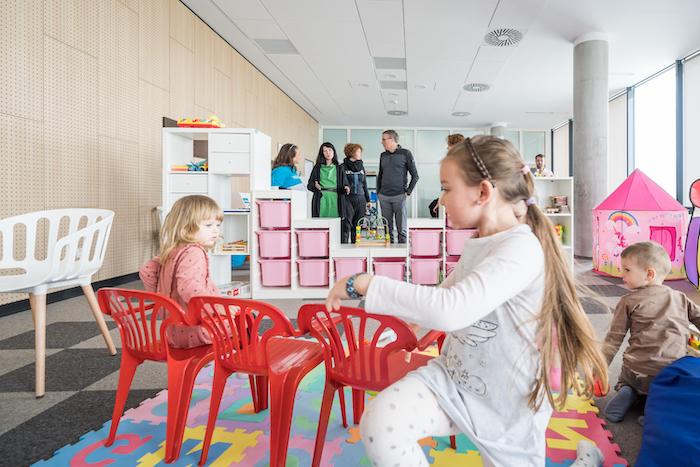
Children play inside a child-friendly space at the Blue Dot center in Brasov, Romania, as UNICEF USA President and CEO Michael J. Nyenhuis and colleagues speak with center staff. The spaces provide an opportunity for children who have fled the war in Ukraine to play and connect with other children, an important aspect of UNICEF's emergency response efforts.
So how can Americans help?
MICHAEL NYENHUIS: This is a huge relief effort. I's unlike anything we have seen since World War II, the speed with which people have had to flee their homes and flee the country. This requires a huge amount of resources. UNICEF has been on the ground in Ukraine for 25 years, with 150 staff there working out of eight locations, along with staff in neighboring countries supporting the refugees. We need financial support to make all of that work. So we'd love for people to go tounicefusa.org, check out what we're doing, pitch in and support —and take some of the advocacy action that I mentioned.
Kids are pretty resilient, aren't they?
MICHAEL NYENHUIS: Of course they are. They're incredibly resilient. But what that requires is getting back to a sense of normalcy as fast as possible. It's one of the reasons that we have child-safe play spaces in our Blue Dot centers so kids who have been through however many hours it took them to get to a border and cross a border, they can come in and get with some other kids and play together. That's critical.
Is the U.S., is the West doing enough?
MICHAEL NYENHUIS: UNICEF is certainly one of the critical players there, but there are a lot of humanitarian organizations from the U.S. that are doing work over there too. We coordinate really well through a coordination system set up by the UN so that we're not stepping on each other's toes and that we actually get complementary work done, and we're doing that. But there’s not enough. We need more resources to support the teams we have on the ground there. This is going to be a long-term crisis and it's going to require us to be there for a long time.
Support UNICEF's emergency response to the war in Ukraine. Donate today.
Top photo: UNICEF USA President and CEO Michael J. Nyenhuis bonds with a child from Ukraine who is receiving care at a center in Baicoi, Romania, where the community has been welcoming refugees with open arms. All photos by Adrian Holerga for UNICEF USA

